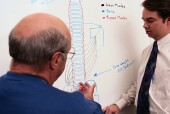Geriatrics
Home Geriatrics
Daytime Noise Tied to Higher Dementia Risk
More daytime noise tied to 30 percent higher risk for mild cognitive impairment, Alzheimer disease
Heart Failure Risk Rises As Weight Increases
But losing some weight might help decrease the damage
Israel Offers COVID-19 Booster Shots to Anyone Over 60
Announcement comes amid increasing infections and indications that the vaccine's efficacy fades over time
Once-Yearly Counseling Tied to More Physical Activity in T2DM
Increase in light and moderate-to-vigorous physical activity and reduction in sedentary time
Stopping RAS Inhibitors May Worsen Outcomes in CKD
Stopping therapy tied to lower risk for dialysis, but higher risk for cardiovascular events and death
Kneeling Posture Impacts Chest Compressions’ Effectiveness
Efficacy of CPR compressions better in self-adjusted, nearest kneeling postures versus farthest
Medical Students Want to Focus Learning on Preparing for Future
Desired topics include leadership training, health policy, health economics, experiential learning
Design Thinking Enables Med Students to Solve Challenges
Partnership with design students focuses on innovative solutions to health system issues
Active Surveillance for Low-, Intermediate-Risk Prostate Cancer on the Rise
However, significant differences in use seen by race/ethnicity, education, and geography
Caffeine Does Not Appear to Be Linked to Risk of Arrhythmia
Regular intake of coffee and tea seems safe and may be beneficial; energy drinks may increase risks


















